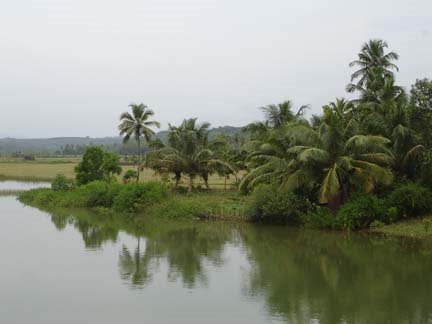There are several places in the Karavali known as 'Angadi's. For example
Haleanagdi, Hosangadi,
Belthangadi, Uppinangadi etc. An 'Angadi' means a shop in current Tulu and in Kannada. If we use that accepted prevalent meaning to these places these cited above would mean Old shop, New shop, White shop and Salt shop! No this in not true in the historical sense. In these words, the phrase 'urban area' or 'town' needs to be replaced instead of the 'shops'. Analysis of the word '
Angadi' suggests that it originally meant an urbanized area where shops situated like a market or bazaar.
VelanganiThere are places known as 'Angadi' s in Kerala also, implying that this toponymistic word was prevalent in different parts of the West Coast. Eventhough Angdi as a place-name is rather uncommon in Karnataka mainland, other variants of the word apparently existed around East Coast. For example Velangani ( or Vailankanni) in Tamilnadu suggests that it was Vela+angani, the 'angani' being a regional variant of the 'angadi'.
AngadiAdi (pronounced 'aDi') means 'the bottom' or 'the foot'. It originally represented the shade under a large tree where early Paleolithic human beings rested, before a culture of construction of huts initiated. The phrase 'maratta aDi, punkyeda aDi'(=shade of a tree, shade of tamarind tree) etc are used even now by the Tulu village folks.
ADi later represented a habitation with passage of time. Further it also represented an unit of measurement like 'aDi' (one foot, equivalent of a footstep).
PāDi (a farm or an area with trees) is derived from aDi. (pa+aDi) Examples include Bellipadi, Bellarpadi, Kukkipadi Ulipadi etc. Similarly māDi (ma+aDi) is also derived from aDi. Examples Hejamadi, Hemmadi etc.
The word 'ang' is a variant of 'anj' or 'anje' representing an open or uncovered area. (Note the word 'angai': ang+kei =open hand or the palm).
The words
angar( Naiki language), angari (Naikri language ) and angad (Parji language) mean courtyard or bazaar in ancient Dravidian languages. (See 141. Village name suffixes)
The word 'angar' was an ancient equivalent of 'angadi', the bazaar. The words 'angār' and 'angaDi' (=bazaar or market) (as in Haleanagdi, Uppinangadi, Belthangadi, Hosanagadi Koppalangadi, Murathangadi, Mudarangadi etc) were in turn derived from --anj or -ang.
Therefore the word 'angadi' represented a open shaded area. Trade began in such open areas as seen in rural markets. Since the people met here for trade and other purposes these areas became the initial urban centres.
MangarOne of the oldest names of Mangalore was Mangar! Since 'angār' is a variant of 'angadi', mangar ma+ang+ār) could represent an ancient market or bazaar on somewhat an elevated ground (ma).
Haleangadi ,HosangadiThe place name 'Haleangadi' thus means Old market or town. It signifies shifting of the market or township. 'Posangadi'(=new market) in Tulu represents the area where new market was initially. Located.
Apart from the Halenagadi-Posangadi near Mulki, there is a Hosangadi near Siddapur in Kundapura taluk.
BelthangadiThe place name Belthangadi on the way to Dhamasthala originally was Belle-ta- angadi, the market/town of Belle. There are other 'Belle' villages especially in Udupi taluk. The 'Bellar' or 'Vellar' were a fair skinned tribals that settled in various parts of southern India. Bellara Bellari Bellipadi etc (see also 131.
Belman to Bellarpadi)
UppinagadiThree possibilities can be deduced with regard to the origin of the name Uppinagadi.Possibly the place name evolved through three stages cited below No 3 to 1 with passage of time.
1.People now believe that the place Uppinagadi has association with salt trade. Uppingadi is situated at the confluence of two rivers namely Nethrāvati and Kumārdhāra.
2.Apart from the salt market tag, the Uppinagadi could have been a modification of Uppuna- angadi, the 'uppuna' represents a residing place.
3.The other possibility is that it was Uphe-na- angadi, where the Munda word 'uphe' or 'ubhe' means two or the junction of two rivers.(see posts 52 and 53). The Tulu equivalent name 'Ubār” (ubh+ar) also suggests of the habitation (ār) by the side of 'ubha'(=two; denoting the two rivers). The ancient word 'ubha' seems lost in current Tulu, but note that it has been preserved in the word 'ubaya' which means 'the both' or 'the two' .
Hosabettu Viswanath adds note on the word 'Ubar' (2):
Ubar/Ubaar (2) also means 'high tide' and brackish or salinity.The word is equivalent of 'ubbara'(Kannada) meaning high tide of the sea. Saline soil and land is called 'ubar nela'. The stink emanating from fields, submerged by high tide salt water, is known as 'ubar-moori' in Tulu. So fish caught in rivers or fields in monsoons smell 'ubar-moori'. It is a known fact that marine fish swim upstream along the estuary, during floods in rainy season and hence the Tulu idiom/proverb, "
Ubargu badtina/mittarina meenigu abur ijji" (=No respect for the fish, which swims up-stream during high tides, i.e.they are vulnerable since caught easily).
In monsoons, the Gurupur (Palguni) River gets flooded. In turn the 'Bailare', stretching from Posodi (Hosabettu) to Panambur where the Bailare was debauching into the River (prior to construction new Mangalore Harbour), gets flooded. In those days, there were big catch of fishes, normally found in sea water, such as 'Maala', Paare' (Mullet),etc. in nets spread in Bailare, which is a natural course for storm waters.
However it may be noted that there are no evidences of high tide or salinity reaching up to Uppinangadi along the River Nethravati. But it is known that traditionally wood,rice, salt, condiments and other merchandise were being transported along the River Nethravati that connected the Coast and the Ghat uplands.Therefore, the name Tulu 'Ubar' for Uppinangdi could have been derived from (1) open yard (ar) by the side of two rivers(uba) or (2) open yard where salt was stocked for trade(ubar-salt, the product of high tide).
*



